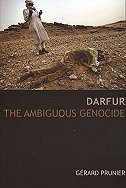|
Darfur: The Ambiguous Genocide
|
|
Gerard Prunier
|

|

In mid-2004 the Darfur crisis in Western Sudan forced itself on to the centre stage of the world. A formerly obscure 'tribal conflict' in the heart of Africa has escalated into what could be the first genocide of the twenty-first century. Its characteristics - Arabism, Islamism, African consciousness, famine as a weapon of war, mass rape, international obfuscation and a refusal to look evil squarely in the face - reflect many of the problems of the global South in general and Africa in particular.
Because of the urgent need for knowledge about this humanitarian catastrophe, journalistic explanations of the unfolding crisis have often been rushed and given to hurried generalizations and inaccuracies. Darfur: The Ambiguous Genocide explains what lies behind the conflict, how it came about, why it should not be over-simplified and why it is so relevant to the future of the continent.
Prunier sets out the ethnopolitical make up of the Sudan and explains why the Darfur rebellion is regarded as a key threat to Arab power in the country, much more so than the secessionism of the Christian south. This, he argues, accounts for the government's deployment of 'exemplary violence' by the Janjaweed militias in order to cow other Black Muslims into subservience.
A renowned analyst of east Africa, the Horn, Sudan, and the Great Lakes of Africa, Gerard Prunier is a research professor at the University of paris. He is the author of The Rwanda Crisis: History of a Genocide (Hurst, 1995) and of From Genocide to Continental War: The Congolese Conflict and the Crisis of Contemporary Africa (Hurst, 2006).
|
|
